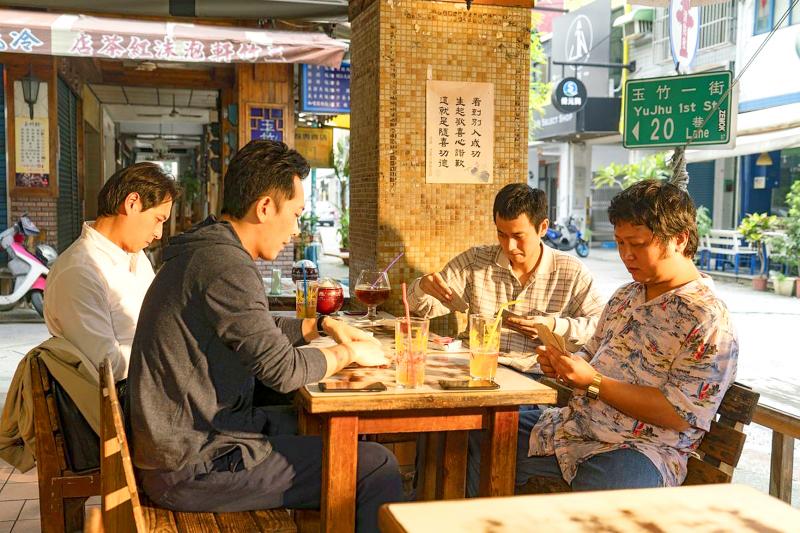Director Huang Hsin-yao (黃信堯) continues his irreverent, absurd commentary of the mundane struggles of ordinary people in Classmates Minus (同學麥娜絲), his second feature after breaking onto the scene with 2017’s The Great Buddha+ (大佛普拉斯).
Classmates Minus won the Audience Choice Award at last week’s Golden Horse Film Festival, and is even more relatable to local viewers than The Great Buddha+ as it literally just follows the lives of four high school buddies in their forties who live in the same small southern town they grew up in.
Huang plays himself in the film, a director who is shooting his next project after finding success with The Great Buddha+. He provides the same cynical yet humorous narration reminiscent of traditional Taiwanese storytellers throughout the film to tie everything together, adding to the surrealness by breaking the fourth wall at times to converse with the characters. At one point, he even hilariously explains to the audience why he cast the same actor in three roles. This narrative role is crucial to the pace and depth of the story, especially as many things are left unsaid with such male friendships.

Photo courtesy of Applause Entertainment
The antics do go over the top in some scenes and verge into tomfoolery, but overall the film presents the right amount of biting satire and silly laughs to keep the audience entertained while getting Huang’s vision across. Despite the loaded cinematic devices, the events and characters are very much rooted in reality, even painfully so, but life is more palatable when it’s not taken too seriously.
On the cusp of entering middle age, the four BFFs all suffer from missed opportunities of some sort and struggle to make sense of where they stand in the world. Their youthful optimism and unbridled energy is long gone, but they’re still grasping for a better life and have something to prove before they get too old. This sentiment speaks to audiences of all ages, albeit strictly from a male perspective as the female characters are presented mostly as mere accessories. Yes, it’s a story specifically pertaining to Taiwanese men in their forties, but handling the women in their lives with more nuance would actually add to the overall picture.
The danger of making a film that tries to tell the stories of multiple leads is that it either focuses too much on one or two characters, or fails to dig deep enough to present a convincing picture of any of them. But Huang makes it work here, as all four leads are quite fleshed out with distinct experiences that are more or less equally relatable to the viewers.

Photo courtesy of Applause Entertainment
Cheng Jen-shuo (鄭仁碩) plays Dianfeng, a hard-working insurance salesman who keeps missing out on promotions and worries if he’ll be able to take care of his girlfriend and unborn child. Liu Kuan-ting (劉冠廷) portrays Blockage, who suffers from severe stuttering and makes paper effigies for a living, and who missed out on romance due to his job and devotion to caring for his grandmother. Nadow (納豆) channels his usual unconfident, unattractive but endearing persona into Guantou, who is recovering from a suicide attempt. He runs into his high school crush again through his new job, and struggles with how to proceed since she has become a sex worker. Finally, Shih Ming-shuai (施明帥) portrays A-tian, a small time director who missed the grand lottery by one number. After a chance encounter, he finds himself suddenly a political pawn who is pushed into running for legislator.
The four regularly gather at a tea shop to play cards and smoke cigarettes — which is where their lives mainly intersect, although they also help each other out when one is in need. Their lives may be jumbled and confusing but they’re all straightforward, likeable fellows whose lives didn’t turn out how they wanted — and beneath the film’s wackiness and relentless societal parody is permeating sadness and despair that lingers long after the laughter ends.
Not getting his big break until the age of 44, Huang should understand the film’s sentiment the best, and even after he became a household name he notes in the opening that his life didn’t change that much.
But as the film suggests, what can one do about life besides poke fun at it and soldier on?

April 14 to April 20 In March 1947, Sising Katadrepan urged the government to drop the “high mountain people” (高山族) designation for Indigenous Taiwanese and refer to them as “Taiwan people” (台灣族). He considered the term derogatory, arguing that it made them sound like animals. The Taiwan Provincial Government agreed to stop using the term, stating that Indigenous Taiwanese suffered all sorts of discrimination and oppression under the Japanese and were forced to live in the mountains as outsiders to society. Now, under the new regime, they would be seen as equals, thus they should be henceforth

Last week, the the National Immigration Agency (NIA) told the legislature that more than 10,000 naturalized Taiwanese citizens from the People’s Republic of China (PRC) risked having their citizenship revoked if they failed to provide proof that they had renounced their Chinese household registration within the next three months. Renunciation is required under the Act Governing Relations Between the People of the Taiwan Area and the Mainland Area (臺灣地區與大陸地區人民關係條例), as amended in 2004, though it was only a legal requirement after 2000. Prior to that, it had been only an administrative requirement since the Nationality Act (國籍法) was established in

With over 80 works on display, this is Louise Bourgeois’ first solo show in Taiwan. Visitors are invited to traverse her world of love and hate, vengeance and acceptance, trauma and reconciliation. Dominating the entrance, the nine-foot-tall Crouching Spider (2003) greets visitors. The creature looms behind the glass facade, symbolic protector and gatekeeper to the intimate journey ahead. Bourgeois, best known for her giant spider sculptures, is one of the most influential artist of the twentieth century. Blending vulnerability and defiance through themes of sexuality, trauma and identity, her work reshaped the landscape of contemporary art with fearless honesty. “People are influenced by

The remains of this Japanese-era trail designed to protect the camphor industry make for a scenic day-hike, a fascinating overnight hike or a challenging multi-day adventure Maolin District (茂林) in Kaohsiung is well known for beautiful roadside scenery, waterfalls, the annual butterfly migration and indigenous culture. A lesser known but worthwhile destination here lies along the very top of the valley: the Liugui Security Path (六龜警備道). This relic of the Japanese era once isolated the Maolin valley from the outside world but now serves to draw tourists in. The path originally ran for about 50km, but not all of this trail is still easily walkable. The nicest section for a simple day hike is the heavily trafficked southern section above Maolin and Wanshan (萬山) villages. Remains of